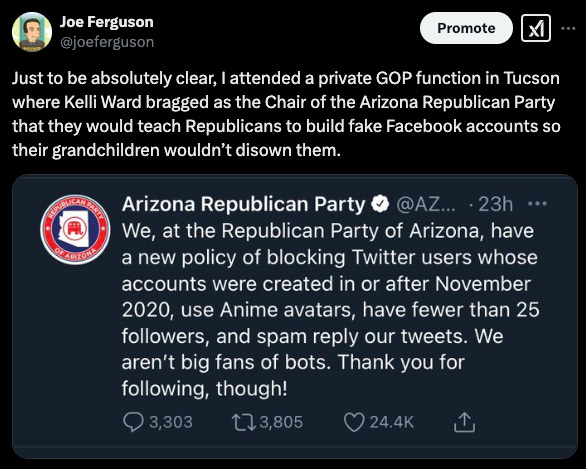Back where he belongs
Returning from the dark side … The biggest count of the year … And those are some explicit public records.
I didn’t think I was coming back to journalism.
I spent the last five years of my life believing there wasn’t a place for me in journalism anymore. If I’m being honest, I genuinely assumed the door closed behind me.
Decades ago, my journalism professors at the University of Arizona ingrained in me that journalistic independence required a near monastic neutrality. Leaving the industry to work in the public sector (or, equally bad, going into PR) would be going over to the “dark side” and earn me a lifetime ban in journalism.
I gave that some serious thought before I decided to leave the Arizona Daily Star almost exactly five years ago to work in the public sector. It wasn’t just a new job — it was the end of my journalism career.
But those lines were drawn in an era when there were at least two daily newspapers in nearly every major metropolitan city and TV stations had helicopters to cover traffic reports. Those days are long gone. And I don’t think public service is tantamount to going over to the dark side.
Today’s journalistic ecosystem operates differently. There’s no litmus test to decide who can get a press pass. And when anyone can be a journalist, it’s important that journalists have a keen understanding of the topics they cover.
Working in local government gave me an excellent peek behind the veil, something that couldn’t be taught in a classroom and that I couldn’t have learned without briefly leaving journalism. What I’ve learned can inform our reporting, and improve and expand the public discourse.
I return to journalism with a new skill set and a better understanding of how the bureaucratic side of local (and to a lesser part, state) government functions. I even gained a little empathy for the pressures of being an elected official.
These past few weeks have been a blast. I hit the ground running, covering public meetings, scouring memorandums and staff reports, talking to old sources and beginning to attend local political events — all while working with the rest of the team here in the Agenda universe.
I’m having the time of my life helping to build the Agendaverse, pushing the boundaries and attempting to reinvent independent local news that actually serves its audience in a way that both engages and informs our readers.
If you like what we’re doing here at the Tucson Agenda, help us keep doing it by upgrading to a paid subscription!
Those who know me well know that I never stopped thinking like a journalist. And as a journalist, it makes me immensely uncomfortable to talk about myself.
But I am proud of my brief foray as an elected official.
I was part of a small group of “rebel” constables who tried to do the job differently, using my role as an elected official to do more than simply serving papers — we offered resources to those facing evictions. And before the various eviction moratoriums popped up during COVID, we Pima County constables refused to evict anyone until the state issued guidance on how to proceed during a public health emergency.
If you were to ask, I would say I am a recovering politician.
And while I have a newfound respect for anyone willing to enter the gladiator’s arena that is modern politics, I am not going back.
Journalism is where I belong.
I think I was always destined to become a reporter.
The love affair started early, learning how to read on my father’s lap, sounding out words in the Milwaukee Journal comics section. It was called the Green Sheet because it was dyed green and I thought it was cool to have my own section of the newspaper.
I was reading news stories before I entered the first grade. In fact, I got in trouble because I refused to read the books in my first-grade class, dismissing them as “boring” compared to the news.
By high school, I was hooked. I started working at the school newspaper, asking questions, challenging the status quo — they threatened to shut down the school newspaper for an editorial I wrote about citizen hall monitors (I still never found out if they did background checks on those snitches) — and telling stories that would have likely never been told otherwise.
Decades later, I still have that fire in my heart.
Ok, enough about me. Let’s talk about the work.
Here is what to expect other than my byline in the Tucson Agenda every morning.
For those of you who’ve followed my live-blogging in the past, I’ve already been getting my thumbs back in shape for those long public meetings. I enjoy it immensely. I’ll be using Bluesky.
For those unfamiliar with my running commentary, it looks like this:
I’m so proud to be able to call myself a reporter again here at the Tucson Agenda. And I can’t wait for my first byline (that isn’t just talking about myself) in the Arizona Agenda.
I’ll be doing public appearances, too. Next week, I will be speaking to the Democrats of Greater Tucson to talk about the Tucson Agenda. You can register here. (I’d be happy to talk to your group too, just drop me a message at joe@tucsonagenda.com.)
To be clear, my return to journalism isn’t partisan. It is not about who is in the White House or any single politician.
But some moments in history feel more important than others. And I’m glad to be back doing the work I love at a moment when it feels more essential than ever.
Thomas Jefferson put it best two hundred years ago when he likened the Fourth Estate to a tocsin (a warning bell) — in that it was the sole entity completely independent of government that had the freedom to criticize powerful elected leaders.
We are living in a world with a lot of uncertainty and chaos. And veteran journalists like myself are tasked with explaining how these new policies — whether good, bad or dumb — will impact Southern Arizona.
I am borrowing a bit of dialogue from The West Wing when I say "I don't know if there's ever been a more important time to be good at what I do."
While Joe has hustled for the Tucson Agenda all month, we also launched three weekly verticals that tackle some of the most important issues in the state.
Here’s what they did this week:
The Education Agenda showed how a financial debacle played out at a Phoenix school district, and how a similar fate could befall every public school in the state if Arizona lawmakers don’t step up.
The A.I. Agenda showed how Arizona lawmakers are starting cold when it comes to regulating artificial intelligence. That could cost the state in the long run, as billions of dollars are on the table and other states’ legislatures are racing ahead.
The Water Agenda broke down bills that threaten to undo groundwater regulations approved by voters in Cochise County, and would do the same anywhere else in the state where local voters try to control their water destiny.
A good read: Wednesday was an important day for homeless policy in Tucson. It was the yearly point-in-time count of unsheltered people, which is conducted in late January in communities across the country, and becomes the benchmark for policies for the rest of the year. The Arizona Luminaria staff spread out across the city to talk with unsheltered people around fire pits, inside medical clinics, and at the headquarters of the people doing the counting.
Getting solid footing: After years of lobbying by faculty, the University of Arizona is going to start signing more multi-year contracts, the Arizona Daily Star’s Prerana Sannappanavar reports. The move would give more stability to nearly 300 faculty members, which is part of new UA President Suresh Garimella’s goal of improving morale.
Crisis after crisis: The Douglas City Council declared a state of emergency in light of Donald Trump’s executive actions on the border, which the council expects will hurt the city’s economic lifeblood: local, cross-border commerce, the Herald/Review’s Lyda Longa reports. Douglas Mayor Jose Grijalva says the federal government should compensate the city if it shuts down the border. The city council approved the declaration by a 3-2 vote.
"While there is no immediate invasion of narcotics and crime within the city of Douglas, I find it necessary and prudent to prepare for the influx of military personnel to the southern border, to take every lawful precaution available in order to protect the health, safety and welfare of Douglas's citizens,” Grijalva wrote in the declaration.
Keeping the focus local: The Santa Cruz County Sheriff’s Office is pulling out of a program that paid deputies to do border enforcement work on the federal government’s dime, the Nogales International’s Daisy Zavala Magaña reports. Sheriff David Hathaway, a Democrat, said he wants to keep better control of his staff, instead of having them reporting to the Border Patrol as part of the program, known as Operation Stonegarden. Hathaway also noted the overtime payments through Stonegarden added a financial burden to the county by raising deputies’ pension payments, which aren’t covered by Stonegarden.
We find a lot of things to laugh about while covering the news every week, but I am going to end the week by laughing at ourselves, and how a younger version of myself inadvertently bought a lot of porn (ads) as part of a public records request.
In 2015, the Star was investigating how several Tucson police officers might be involved in a local prostitution ring and we relied heavily on public records. At some point, the internal affairs investigation was turned over to the Arizona Department of Public Safety.
When the reports were ready, we were eager to get our hands on a copy. At the time, the records clerk in Phoenix asked if we wanted every single page. Of course we did, I responded, even though the clerk strongly suggested it was going to be expensive at 50 cents a page.
So, sight unseen, I drove to Phoenix, paid for and picked up the reports. And they included everything - interview transcripts, phone logs, text messages, an executive summary for each officer investigated and every single ad that the escorts had posted online. There were hundreds of poorly scanned ads of the women advertising their services, often in pretty blatant language.
This would be merely embarrassing and would have been relegated to a file cabinet to hide my shame, but here is the kicker - my boss needed to see a copy of the reports. So did their boss. So did the publisher.
Lesson learned: Always ask if you can review the document before buying it.











Glad to see you back in journalism, Joe. You're doing great work for the Agenda.
Thanks for the article from the Luminaria on the Point-In-Time count. If we know the facts regarding the homeless there will be less hate and disinformation spread about. It is about the humanity in all of us.